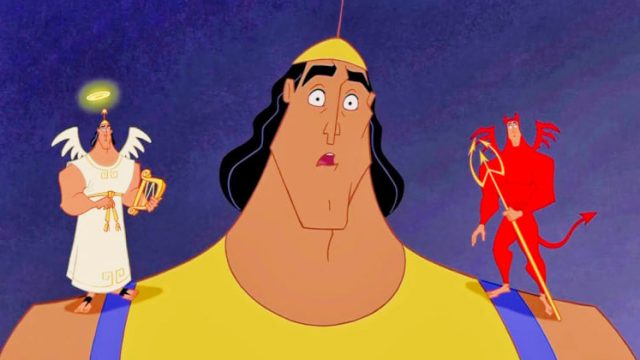It’s not just for trial memberships at the gym anymore. Celebrities, band names, documentaries on difficulties at Disney, essays – all can find themselves facing cancellation in today’s FAR. Even beloved sitcoms can get the ax after a mere eleven seasons!
Thanks to Miller for his contributions this week, may he always be renewed. Send articles next week to ploughmanplods [at] gmail, post articles from the past week below for discussion, and have a Happy Friday.
The always-interesting Abel Ferrara talks to The Hollywood Reporter about Italy, Willem Defoe and what it means to be canceled:
I don’t know about being cancelled. It’s a scary word. It’s like being deleted, eliminated. But everyone has to confront — I’m a Buddhist, so I’ll say it — your karma. Your actions are going to define who and what you are, and you’ve got to answer to it. But you could overcome it. You could rise. It’s not an execution. I mean every one of us, everybody who’s in jail, they’re not dead. So, they have to try to make amends for what they have done and who they hurt. And that’s it. Right now, things are happening fast. What did Vladimir Lenin say? Sometimes decades go by and nothing happens, and sometimes weeks go by, and decades happen. I think that’s what’s happening now. I hope what went down in the last month is really going to inspire some real change.
Did you know The Emperor’s New Groove had a behind-the-scenes documentary about its tumultuous production which couldn’t be cancelled because it was part of Sting’s conditions for signing on? Petrana Radulovic at Polygon has the scoop on what went wrong at the time and why Groove plays so well now.
In many ways, The Emperor’s New Groove benefitted from internet culture in the same way The Road to El Dorado did. People who grew up with the movie latched onto the comedic aspects. The early 2000s marked a shift in animation from the Broadway-style Disney epics, like Beauty and the Beast and Anastasia, into the heavily comedic tone of movies like Shrek and Ice Age, which defined the landscape for the next decade or so. The Emperor’s New Groove — much like El Dorado — arrived just ahead of that total shift.
Nick Pinkerton had an essay ready for the Kino Blu-Ray release of Lost Highway, only to have the finicky David Lynch order it cancelled at the last minute. He provides it to us this week:
Though Lost Highway doesn’t travel far from the precincts of Los Angeles, it is in some way as much a road movie as writer/director David Lynch’s follow-up movie, the Midwest-traversing The Straight Story (1999). Crucial to the earlier film is the possibility of escape promised by the highway, a promise central to the mythology of the car-crazy America of Lynch’s boyhood, the lustrously chromed, tailfinned products of which play vital supporting roles in the movie: take the pivotal scene of lust-at-first-sight in which a young automobile mechanic at work is transfixed by a beautiful blonde stepping out of a sleek black 1960 Cadillac Series 62 Convertible. Cars mean sex; they also mean flight, freedom—the offer to “take a ride” recurs in the movie with both connotations, and others more ominous besides.
The Drive-By Truckers’ Patterson Hood writes for NPR about Lady Antebellum, Gone With The Wind and why his band’s name could be cancel-worthy:
The band name was intended as a tribute to two forms of music that I loved and revered. Hip-hop in the mid-’90s was filled with crime sagas, not necessarily far removed from the content of old Johnny Cash songs — which, of course, I also loved — and a direct descendant of the narcocorrido. I would not (and regardless, could not) rap, but I could approach my subject matter in a lyrical way, set to this old music that was a new passion of mine. From the start, the band was fun and rowdy and loud as hell. Our name had an irreverence that befit our style and sense of humor. It was such an absurd band name that I didn’t have to worry about a blues performer in Seattle having the same. I had the privilege of being blissfully unaware.
And Vikram Murthi goes long on the (long cancelled) Cheers and specifically the up and down, true and toxic relationship between Sam and Diane:
Cheers started from a place of disharmony. The writers forged battle lines specifically on the grounds of intelligence and sex: an uninhibited, womanizing ex-pitcher versus a proper, pretentious graduate student. Sam’s professional identity, before he became a full-time bartender, was centered upon his body; Diane, the aspiring writer and permanent student, built hers on the strength of her mind. Sam rarely stops to consider his actions while Diane frequently overthinks herself into mental paralysis. Sam has few moral or ethical scruples, whereas Diane lives by strict codes. Sam’s life revolves around casual affairs, but Diane seeks long-term commitment. Sam frequently speaks monosyllabically, whereas Diane can hardly get through a sentence without citing Greek poetry. It’s crucial that these characters, as written, from the very beginning, are definitionally incompatible.


